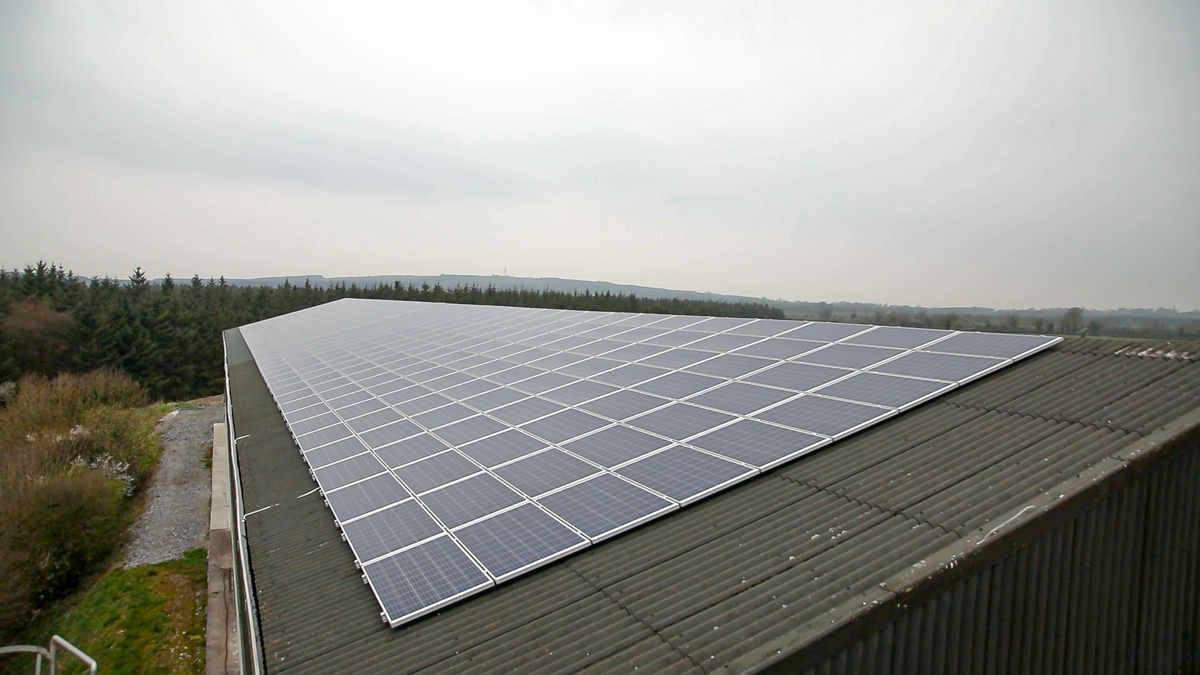In several counties across Ireland, the amount of electricity generated through solar PV that can be exported from farms to the grid is “curtailed”, managing director at Local Power Ltd. and Micro Renewable Energy Federation (MREF) chair, Pat Smith has said.
The “biggest issue” facing the rollout of solar PV in Ireland is the capacity of the grid in order to take in renewable energy, Smith said and stressed that the existing grid in Ireland needs to be “massively upgraded, quickly”.
All farmers who have a grid connection agreement for solar PV, even if grant supported through the Targeted Agricultural Modernisation Scheme (TAMS), can export to the gird and receive a payment for it, according to Smith.
Speaking to Agriland, Smith said: “There’s an urgency of increased and significant investment required in the grid to ensure that all micro generators are allowed to export to the grid and to get a payment for it.
“In Ireland, we are already seeing curtailment in a number of counties where the amount that a particular farmer can export to the grid is being restricted because the grid is not capable of taking it.”
This situation, he said, is a “warning” that more investment needs to be put into the grid “as quickly as possible” to accommodate all the renewables coming in going forward.
Smith believes that rooftop solar PV should be prioritised. “We have enough roofs in Ireland on farms and businesses to build out 3,000MW of rooftop solar. That should be the priority, rather than deploying solar farms,” he said.
European Solar Charter
Meanwhile, a European Solar Charter has been signed by 23 EU member states and industry representatives which sets out a series of voluntary actions to be undertaken to support the EU photovoltaic sector. However, Ireland is not a signatory.
The signatories commit to supporting the competitiveness of the European PV manufacturing industry, and promoting the creation of a market for high-quality products meeting high sustainability and resilience criteria.
Achieving the 2030 EU target of at least 42.5% renewable energy by 2030, with an ambition to reach 45%, will require further acceleration in the deployment of renewable energy, including solar energy, the European Commission said.
The bulk of the demand for solar modules in Europe is covered by imports from China. This concentration creates short-term risks for the resilience of the value chain and long-term risks for price stability for solar panels, the commission said.
European solar module manufacturers have recently faced a particular challenge due to the combination of import dependency and a sharp drop in the prices of imported panels.

In 2023, the solar PV sector in the EU and globally saw the prices of the panels plummet from approximately 0.20€/W to less than 0.12€/W, according to the commission which said that this is an “unsustainable situation”.
As a consequence, some European companies have either reduced their operations, announced that they would prioritise production in other international markets, in particular the US, or even announced their closure.
Solar PV manufacturing
Speaking to Agriland, the managing director at Local Power Ltd. said the solar industry should welcome the charter as an “attempt” to ensure that there will be sustainable European manufacturing of solar PV components into the future.
In the last couple of years, the Chinese government has supported its own renewable energy manufacturing companies which has led to a collapse in the price of PV modules in many parts of the world, he said.
“In Ireland, there’s no solar PV manufacturing companies, however, if you think medium to long term, it’s critically important that everything possible is done to maintain high-quality solar PV manufacturing across Europe.
“European warranted panels and components have as significant value over and above Asian manufactured components, both on a quality basis and from a warranty perspective,” Smith told Agriland.
When asked whether Ireland should be concerned about imports of solar panels manufactured in China, Smith said that, “as part of the EU, we should be full square behind every effort to maintain European jobs and European manufacturing”.
Why did Ireland not sign the solar charter?
“Committing to the solar charter, as drafted, creates a high risk of increasing the costs to Irish electricity consumers of solar deployment through higher renewables prices and a major risk of delay to Ireland’s renewables auction programme,” a spokesperson for the Department of the Environment, Climate and Communications (DECC) told Agriland.
Support under Ireland’s Renewable Electricity Support Scheme (RESS) is allocated by way of auctions, which are delivered by the DECC. RESS auctions will be held at frequent intervals throughout the lifetime of the scheme.
“While Ireland is supportive of resilience and sustainability criteria for renewable technologies to ensure diverse and secure supply chains, this is best achieved through effective implementation of the Net Zero Industry Act,” the DECC spokesperson said.
The Net-Zero Industry Act aims to ensure that the EU’s overall strategic net-zero technologies manufacturing capacity, including solar PV, approaches or reaches at least 40% of the annual deployment needs by 2030.
The act includes concrete measures, such as accelerated permitting or market access facilitation through the use of non-price criteria in public procurement, renewable energy auctions and other support schemes.
